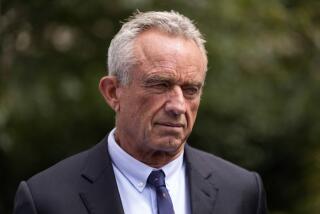McGovern Says He Won’t Run for Presidency in ’92 : Politics: The ex-senator who lost to Nixon in 1972 believes other Democrats will adequately represent the liberal position. His family opposed candidacy.
WASHINGTON — Former Sen. George S. McGovern on Thursday counted himself out of the thinly populated race for the Democratic presidential nomination, saying that he now believes others will adequately represent the liberal point of view.
“From the beginning of this year, I have expressed the hope that a younger, less battle-scarred candidate would become the Democratic nominee in 1992,” said McGovern, 68, who was buried in a landslide by Richard M. Nixon in 1972. “I now believe that is likely.”
In remarks at the National Press Club, McGovern said he would support a candidacy by Sen. Tom Harkin (D-Iowa), Sen. Bob Kerrey (D-Neb.), Gov. Mario M. Cuomo of New York or the Rev. Jesse Jackson, the civil rights leader.
Nearly 14 months before the election, only former Sen. Paul E. Tsongas of Massachusetts has declared his candidacy. Harkin and Jackson have said that they are considering running; Cuomo and Kerrey have publicly indicated lesser degrees of interest.
McGovern, who has been out of office since 1980, when he represented South Dakota in the Senate, now spends most of his time on the lecture circuit. He has agonized in recent weeks about the candidacy decision and was reported undecided as late as Thursday morning.
Members of his family were strongly opposed, fearing that he would be hurt in a race, according to people close to him. Some former campaign aides also opposed the idea, although younger supporters believed that his name recognition could help give prominence to his ideas.
A bid by the four-term senator, who carried only Massachusetts and the District of Columbia in 1972, could have exposed the Democrats to jokes about how desperate the party had become. Some top Democrats have privately made fun of the suggestion of a new campaign by McGovern, who sought the nomination in 1984 also but dropped out after placing third in the Massachusetts primary.
“All the personal factors argue against another bid by me for the presidency: family considerations; the unpleasantness of being on the receiving end of the negative campaigning that now seems to be the order of the day; the risk of ridicule, ineffectiveness and rejection,” McGovern said Thursday. “These and other factors said: ‘Don’t do it.’ ”
On the other side, he said, “is the pull of public service, concern over my floundering party and the condition of our country.”
McGovern said he is eager to communicate several messages to Democrats, including that the country needs to cut defense spending by about half and that members of his party should not be afraid to embrace liberalism.
“It is a matter of some personal embarrassment to me that my party has for the most part either gone along with the Reagan-Bush policies, or, at best, protested with a wavering and feeble voice,” McGovern said.
“We need a conservative party in the United States, but, with all due respect to the Democratic Leadership Council, we don’t need two conservative parties.” The council is an organization of centrist Democratic Party members.
More to Read
Get the L.A. Times Politics newsletter
Deeply reported insights into legislation, politics and policy from Sacramento, Washington and beyond. In your inbox three times per week.
You may occasionally receive promotional content from the Los Angeles Times.











